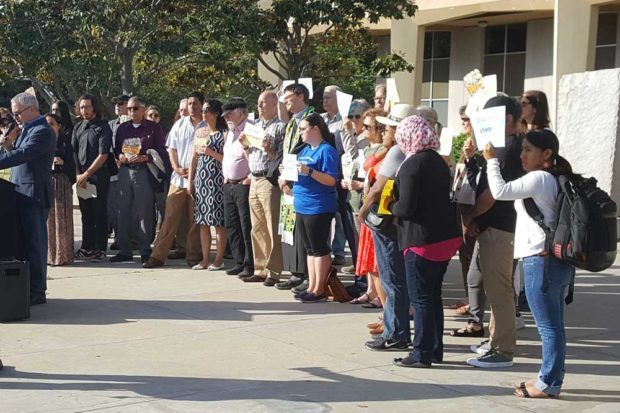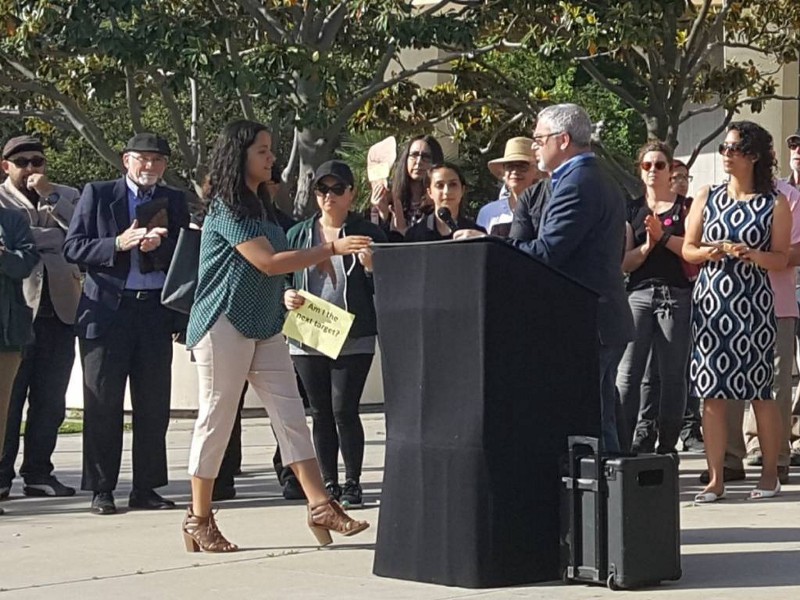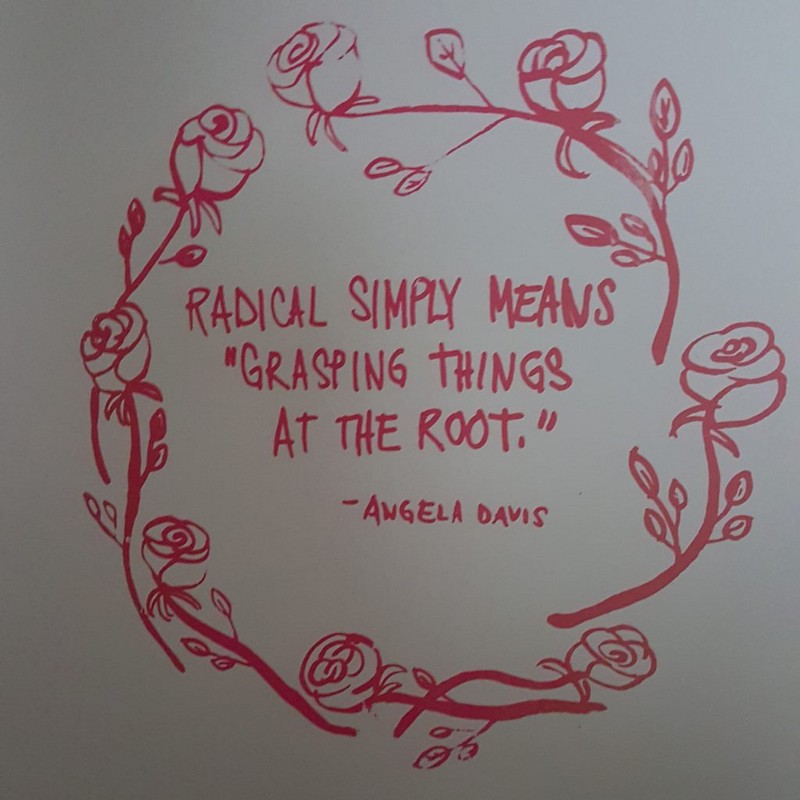
By Community Alliance staff
On May 11, 2017, a press conference was held outside the Fresno courthouse calling for the city to drop the charges against activists from the group Fresno Resistance who were arrested for civil disobedience in March.
An advocate from the community organization, Faith in Fresno, which organized the press conference, said, “We understand that the city says that the charges are not meant to stifle free speech, but it sure feels that way. We are here to support our friends, our family and to urge our city officials not to pursue such charges that make each of us wonder whether we will be next to receive warrants after peacefully demonstrating for causes we hold dear.”
Shannon Kurtz spoke to KFCF 88.1 about the ordeal on April 5. “We had to cancel Resist Fest, which was scheduled for April 15, because we can’t afford to do any more civil disobedience right now.”
Part of Fresno Resistance and on the executive board of the Central Valley branch of the National Lawyers Guild, Kurtz works as a legal observer to ensure people’s rights are not violated while participating in demonstrations. She has also been front and center at these events as an activist.
Kurtz told listeners that she was on air in part to make people aware of the online legal fund at Indiegogo to raise money for Fresno Resistance members who were arrested. You can donate to it here: https://www.indiegogo.com/projects/fresno-resistance-legal-fund#/
The event that the Fresno Police Department took issue with was the March for Liberation and Justice on March 5, where activists got some lockboxes and chained themselves together in front of the Fresno jail, closing the street.
According to Kurtz, “The purpose of the march was to protest the fact that Sheriff Mims allows Immigration and Customs Enforcement (ICE) inside the Fresno County Jail. She does not have to, she is working with them by choice.” Immigration rights activists say that it infringes on the rights of immigrants who have not been charged with a crime to be detained in jails, forced to stay in often inhumane conditions.

Faith in Fresno sent a letter to Fresno Mayor Lee Brand stating their concerns about the arrests and support for Fresno Resistance protestors. “We are writing to you today, however, with great concern from the news that the City of Fresno is using its discretion to aggressively pursue serious charges against four individuals who—among almost 100 others—participated in a peaceful protest on Sunday afternoon, March 5th. We understand it was not until weeks later that these individuals were shocked and confused to learn that they were being charged.”
In response, Mayor Brand’s office sent Faith in Fresno Chapter Director Andy Levine a letter stating that “the City, including the Fresno Police Department (FPD), honors and respects the rights of all individuals to engage in free speech and peaceful protest. The City encourages individuals to exercise these rights. There have been over forty protests or demonstrations held in the City since January 1, 2017. This event is the only protest in which the organizers refused to obey directions from FPD officers, and placed themselves in an unsafe situation by blocking a roadway.”
Bail for the resisters is set at $10,000–$20,000 depending on the number and type of citations of each individual, which include blocking the road and demonstrating without a permit. The reason for the high dollar amount and number of citations per person is not clear to the average citizen. It seems quite arbitrary from the outside. So too does the citation for demonstrating without a permit.
The Faith in Fresno press conference outside the jail—like many other rallies, protests and marches in Fresno—was a demonstration that had not been arranged in advance with a permit.
When 19-year-old Clovis resident Dylan Noble was shot and killed in Central Fresno in 2016, an impromptu vigil at the site of his death turned extremely raucous and even violent. Live video captured by Fresno People’s Media showed demonstrators threw bottles, damaging a police car and shouted obscenities at police, some while carrying Confederate flags. None of these individuals, all of whom were White, were arrested.
This is not the first time that activists have been cited for these supposed infractions. In 2015, Rev. Dr. Floyd D. Harris was cited for blocking the street in downtown Fresno and demonstrating without a permit. Nineteen-year-old Justice Medina was similarly charged for organizing a protest in North Fresno against police shootings of unarmed citizens in 2016. This was one of the largest demonstrations to date in Fresno.
Medina’s bail was also set at a seemingly exorbitant amount. In addition, he was similarly not arrested immediately at the demonstration that Fresno Police Chief Jerry Dyer told the media he was cited for. He was not cited until another demonstration about a week later in front of Fresno police headquarters.
Harris says, “They are making an example of us. They are targeting people, particularly people of color, to intimidate folks and discourage them from speaking out against the violations of people’s rights.”

In her KFCF radio interview, Kurtz said that it was not until March 31, when she was at the protest of Congressional District 22 Rep. Devin Nunes (R–Tulare) outside a North Fresno agricultural fund-raiser, that she was arrested. She was in the back of the building with about 15 other people when a car almost ran over the activists.
When Kurtz tried to lodge a complaint about the driver with police, an officer told her, “Well, maybe he was intimidated by you.” She said this was laughable that a person in a car would be afraid of a pedestrian. Soon after this exchange, she and three others were arrested for the demonstration almost a month earlier.
Kurtz joked that in addition to donating to the Indiegogo legal fund for Fresno Resistance, people could also just give her money on the street if they felt so inclined. In fact, a group of allies set up an online auction to raise money for Fresno Resistance by selling handmade items, artwork and other practical objects people donated to support the cause. You may see some of these items in your friends’ homes.
